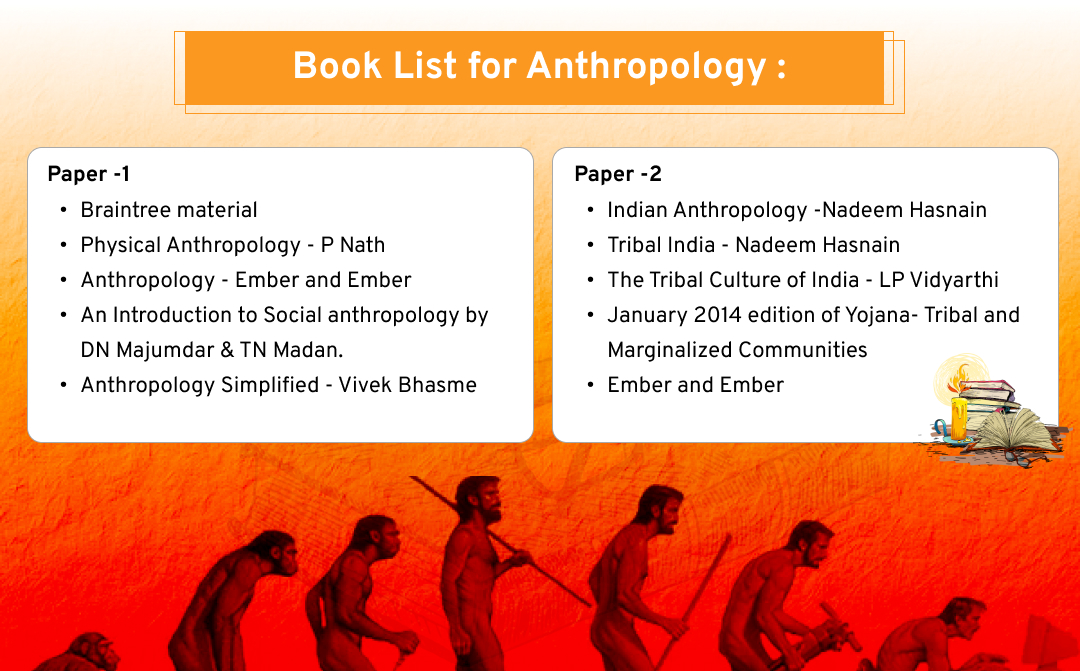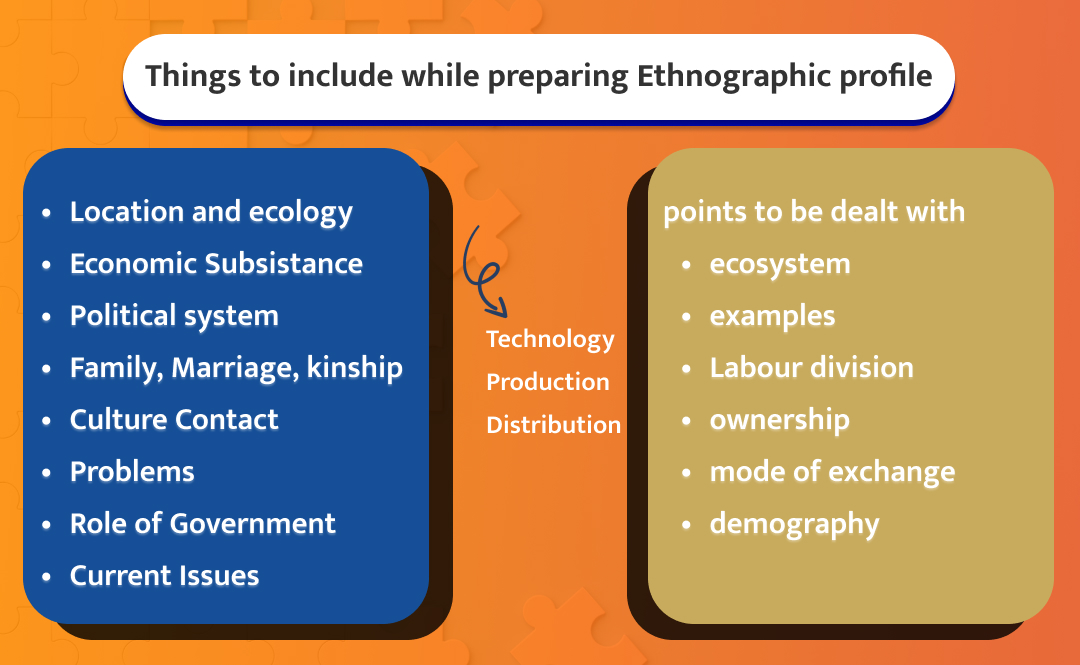Anthropology Optional Subject Course
- Duration: 4 and Half Months
- Study Hours: 2 Hours Per Day Monday to Friday
- Classes Timings:1:00 PM to 03:00 PM
- Fee: 50,000/- English Medium
Mentorship from Senior Faculties
Proven Study Materials
Proven Track Record – 35+ Years
Anthropology Optional
Anthropology is defined as the study of humans and its society and its culture and development of society. As E.B. Tylor states “Anthropology is a study of old Remains of the people and Physical features, race, customs and practices of primates and their language”. This field of study is broad and interdisciplinary, integrating aspects of the natural sciences, social sciences, and humanities to explore the full breadth of the human condition, from our earliest origins to contemporary cultural practices.
Anthropology as optional:
- It is a popular choice among aspirants, especially those with a science or engineering background, due to its scientific nature and the ability to incorporate diagrams and flowcharts in answers.
- The syllabus is considered concise compared to other subjects, and it’s possible to complete the preparation in about four months with the right strategy and study material. Additionally, recent changes to the UPSC syllabus have streamlined the content, potentially making anthropology an even more attractive option for aspirants.
- The syllabus for anthropology covers various aspects such as human evolution, social-cultural anthropology, biological anthropology, archaeological anthropology, and linguistic anthropology.
Pros and cons of taking Anthropology as optional subject:
Choosing anthropology as an optional subject for the UPSC exam comes with its own set of advantages and disadvantages.
Pros:
- Direct Questions: Anthropology questions are often straightforward and factual, which can make it easier to prepare and write answers.
- Scoring Nature: It is considered a scoring subject, especially when compared to core humanities subjects.
- Scientific Approach: The subject’s scientific nature allows for answers to be supplemented with diagrams and flowcharts, which can be time-saving and fetch additional marks.
- Concise Syllabus: The syllabus is relatively short and can be completed in about four months with the right strategy and study material.
- Suitable for Science Students: It’s a good option for candidates with a science or engineering background who do not wish to take their graduation subjects as their optional.
- Interesting Content: The subject matter is interesting and easy to understand, which can make studying more enjoyable.
Cons:
- Limited Guidance: There may be limited guidance available, as not a lot of study material and specialized coaching for anthropology is available.
- Need for Conceptual Clarity: The subject requires a clear understanding of concepts rather than rote memorization, which can be challenging for some candidates
Why is it the most scoring Optional subject in UPSC?
Anthropology is considered one of the most scoring optional subjects in the UPSC Civil Services Examination (CSE) for several reasons:
- Focused Syllabus: Anthropology has a relatively shorter and more focused syllabus compared to other optional subjects, which makes it easier for candidates to cover the entire syllabus thoroughly.
- Logical and Factual Nature: The subject is considered scoring due to its logical and factual nature, which allows for clear and concise answers that can be easily understood and evaluated.
- Overlap with General Studies: Anthropology overlaps with certain topics in the General Studies papers, particularly in areas like social issues, biodiversity, and environmental conservation, which can help in writing better answers.
- Scientific Approach: Its scientific nature allows for the inclusion of diagrams and flowcharts in answers, which can save time during the exam and earn more marks.
- Availability of Resources: There is a good availability of study materials and resources, which aids in effective preparation.
- High Success Rate: Anthropology has shown a relatively high success rate among aspirants who have chosen it as their optional subject.
Book list for Anthropology

Strategy to prepare for Anthropology Optional:
Preparing for the Anthropology optional in the UPSC CSE demands for strategic approach mad to ease you here is a comprehensive strategy to make your preparation more effectively:
- Understand the Syllabus: The UPSC syllabus is crucial as it outlines the exam’s scope, guiding aspirants on what to study. It helps in focused preparation, avoiding unnecessary topics, and serves as a benchmark for evaluating one’s readiness for the exam.
- Resource Collection: Gather the necessary study materials, including standard textbooks and online resources. Some recommended books are ‘Anthropology’ by Ember and Ember and ‘Physical Anthropology’ by P. Nath.
- Study Plan: Divide the syllabus into manageable sections and create a study plan. Allocate time for each section is very important. A study plan is vital for UPSC preparation as it ensures systematic learning, efficient time management, and regular revision. It helps aspirants cover the extensive syllabus methodically and track their progress effectively.
- Conceptual Clarity: Focus on understanding the concepts rather than rote learning. Anthropology is a subject that requires a deep understanding of theories and concepts. Achieve conceptual clarity in Anthropology by understanding fundamental theories, relating them to real-world examples, and discussing with peers. Regular revision and applying concepts in answer writing also enhance understanding. Like given below:

- Interlinking Topics: Try to interlink the topics as you study, as this will help you in better retention and in writing interconnected answers in the exam.
- Answer Writing Practice: Practice answer writing regularly. Include diagrams and flowcharts in your answers as they can fetch extra marks. In Anthropology optional, write structured answers with clear introductions, explanations with examples, and conclusions. Use diagrams and anthropological terms to demonstrate depth of understanding and clarity of thought.
- Previous Year Papers: Analyse previous years’ question papers to understand the pattern and the type of questions asked. This will also help you identify topics of outmost importance. Previous year question papers (PYQS) for Anthropology in UPSC CSE are crucial for understanding the exam pattern, gauging the depth and range of questions, aiding in strategic topic coverage, and providing practice to refine answer writing skills, ultimately boosting confidence and preparedness.
- Revision: Regular revision is key to retaining what you’ve studied. For revising Anthropology optional in UPSC CSE, focus on active recall through self-testing, create concise notes for quick reviews, use diagrams for complex concepts, teach topics to someone else, and solve PYQS to apply knowledge practically. Regularly revise to reinforce memory retention.
- Test Series: Enrol in a test series to evaluate your preparation level. Test series for Anthropology optional in UPSC CSE are vital for self-assessment, time management, and understanding the actual exam pressure. They help identify weak areas, improve speed and accuracy, and simulate real exam conditions, which are key to enhancing overall performance.
- Peer Discussion: Discussing with peers can provide new insights and help clarify doubts. It also helps in keeping up the motivation levels. Peer discussions for Anthropology optional in UPSC CSE are instrumental in diversifying perspectives, as they allow aspirants to exchange insights and knowledge. This collaborative learning process can clarify doubts, reinforce concepts through debate, and expose individuals to new ideas and methodologies. It also aids in staying updated with current anthropological events and developments. Moreover, discussing with peers can boost motivation, reduce study isolation, and provide moral support throughout the rigorous preparation journey. Ultimately, it enriches the learning experience and can lead to a more profound understanding of the subject matter.
Trend of the Examination
- Anthropology is a popular optional subject for UPSC Civil Services Examination (CSE). It’s known for its interdisciplinary approach, covering aspects from humanities, social sciences, and natural sciences. Aspirants like Uma Harathi N, Rank 3 in UPSC 2022-23, and Anudeep Durishetty, Rank 1 in CSE 2017, have achieved top ranks with Anthropology as their optional subject, indicating its potential for high scores.
- The syllabus has remained comprehensive, requiring a deep understanding of human evolution, social structures, and cultural patterns. A detailed analysis of previous year questions from 2013 to 2023 shows a balanced mix of theoretical and applied questions, reflecting the subject’s dynamic nature and relevance to current affairs.
- Overall, Anthropology continues to be a viable and scoring option for UPSC aspirants who have an interest in studying the breadth of human experience.
Trend of questions asked in exam
- Over the last decade, the UPSC CSE mains anthropology optional has exhibited a consistent trend towards integrating interdisciplinary perspectives, reflecting the subject’s comprehensive nature. The questions have progressively emphasized the application of anthropological concepts to contemporary issues, demanding a deep understanding of socio-cultural dynamics.
- The papers have consistently covered core topics such as human evolution, prehistoric archaeology, social institutions, and linguistic anthropology. However, there has been a noticeable shift towards more contemporary issues such as globalization, public health, and environmental anthropology, indicating the UPSC’s focus on current relevance.
- Questions have also evolved to test aspirants’ analytical abilities, moving from straightforward definitions to complex case studies and comparative analyses. This shift underscores the importance of critical thinking and the ability to apply theoretical knowledge to real-world scenarios.
- The inclusion of questions related to biological anthropology has remained stable, with a focus on genetics, human variation, and forensic anthropology. This suggests an on-going interest in the biological aspects of human beings within the context of UPSC’s assessment criteria.
Overall, the trend in anthropology optional questions reflects an increasing emphasis on applied knowledge, interdisciplinary approach, and analytical skills. Aspirants are expected not only to master the theoretical aspects but also to demonstrate their ability to relate anthropological insights to broader societal issues.
The structure of exam for anthropology optional
The Anthropology optional subject in UPSC CSE consists of two papers, Paper-I and Paper-II, each carrying 250 marks, making a total of 500 marks. The structure for each paper is as follows:
- Number of Papers: 2 i.e Paper-I and Paper-II
- Marks per Paper: 250
- Total Marks: 500
- Sections: Each paper has two sections.
- Number of Questions: Each paper contains eight questions, divided equally into four questions per section.
- Questions to Attempt: Aspirants must answer five questions out of the given eight, with one compulsory question from the last three.
- Time Allotted: Three hours are allotted to attempt each paper.
Paper-I:
- Section A: Deals with the foundation of Anthropology, its meaning, scope, and development, and its relation to other disciplines. It also covers the main branches of Anthropology like social-cultural Anthropology, biological Anthropology, Archaeological Anthropology, and Linguistic Anthropology.
- Section B: Focuses on human evolution, primatology, genetic basis of human evolution, theories of evolution, and fossil evidence for human evolution.
Paper-II:
- Section A: It has major Emphasizes on Indian Society and the diversity of India Tribes. It covers the concept of ethnicity, ethnic conflicts, and political processes.
- Section B: Deals with contemporary issues faced by tribes such as development projects, displacement, rehabilitation policies, and constitutional safeguards for tribal populations.

